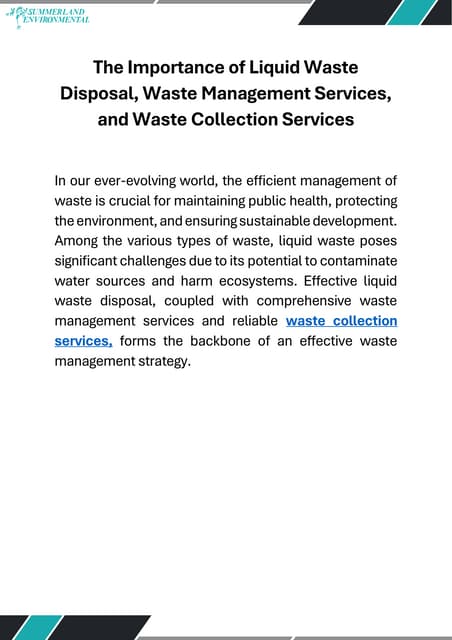Not known Facts About Reclaim Waste
Not known Facts About Reclaim Waste
Blog Article
Reclaim Waste Things To Know Before You Get This
Table of ContentsThe Ultimate Guide To Reclaim WasteReclaim Waste Can Be Fun For AnyoneTop Guidelines Of Reclaim WasteGetting The Reclaim Waste To WorkThe Reclaim Waste PDFs
Explore the types, incidents, and types of liquid waste. Residential sewage waste refers to the waste and items from a property sewage-disposal tank. This type of waste is developed by humans in residences, colleges, and various other buildings. This only consists of septic systems that have a drainpipe field. The proper management and disposal of residential sewage waste call for fluid waste to be moved to a sewer treatment plant where the correct methods and tools are put on detoxify and get rid of waste.
Industrial waste commonly includes prospective hazards, such as flammable materials or a blend of liquid and solid waste items, and calls for an advanced and detailed disposal procedure. The disposal of commercial waste usually involves the filtering of waste before transportation to make certain safe and correct disposal. Industrial waste is created from byproducts and runoff of industrial procedures and production.
This kind of waste can not utilize the exact same sewage management transport or processes as septic or industrial fluids. The industrial waste monitoring procedure requires the inspection and screening of liquid waste before it undertakes the disposal process (liquid waste removal). Overflow waste is the fluid waste that comes from overflow and excess stormwater in highly inhabited areas or cities
Runoff waste can cause contamination and flooding if not managed effectively. Find out more concerning sewage system cleansing and waste administration. Making certain correct waste monitoring can prevent disasters and lower environmental damage. Both individuals in household setups and experts in commercial or manufacturing industries can gain from recognizing the processes and regulations of liquid waste monitoring.
The Single Strategy To Use For Reclaim Waste
Call PROS Solutions today to learn more about our waste monitoring and disposal solutions and the proper methods to take care of the fluid waste you create.
(https://www.gaiaonline.com/profiles/reclaimwaste1/46907679/)Do you understand what happens to your water when you draw the plug, flush the toilet or drain pipes the washing machine? No? Well, it's worth understanding. This so-called 'wastewater' is not just a vital source but, after treatment, will certainly be released to our land, waterways or the ocean. Made use of water from commodes, showers, baths, kitchen sinks, washings and commercial processes is understood as wastewater.

water used to cool equipment or tidy plant and devices). Stormwater, a kind of wastewater, is runoff that streams from farming and metropolitan locations such as roofings, parks, yards, roadways, paths and rain gutters into stormwater drains pipes, after rain. Stormwater moves without treatment straight to neighborhood creeks or rivers, eventually getting to the ocean.
The Buzz on Reclaim Waste
In Queensland, most wastewater is dealt with at sewer treatment plants. Wastewater is moved from residential or commercial websites via a system of sewage systems and pump stations, known as sewage reticulation, to a sewer treatment plant. Local federal governments develop, maintain and run most sewer therapy plants. Operators are accredited under the Environmental Management Act 1994 to release cured wastewater at an acceptable environmental criterion into waterways.
The Department of Natural Resources encourages city governments concerning handling, operating and keeping sewerage systems and therapy plants. In unsewered areas, city governments might call for owners to install private or household sewer therapy systems to deal with domestic wastewater from commodes, kitchens, shower rooms and washings. The Division of Natural Resources authorizes making use of family systems when they are verified to be efficient.
In some new communities, therapy of some stormwater to get rid of litter, sand and crushed rock has begun using gross pollutant catches. Wastewater treatment occurs in four stages: Gets rid of solid issue.
Wastewater then flows into big storage tanks where solids clear up and are removed as sludge. Oil and scum are skimmed from the surface area. Makes use of little living microorganisms understands as micro-organisms to damage down and eliminate staying his comment is here dissolved wastes and fine particles. Micro-organisms and wastes are integrated in the sludge. Removes nitrogen and phosphorus nutrients that could create algal blooms in our waterways and threaten aquatic life.
Indicators on Reclaim Waste You Should Know
Nutrient removal is not available in any way sewage treatment plants because it needs costly specialised tools. It is coming to be extra usual in Queensland. Clear fluid effluent produced after treatment might still include disease-causing micro-organisms. If this effluent is launched into rivers such as rivers or the sea, the micro-organisms will ultimately pass away out.

Many wastewater moves right into the sewage system. Under the Act, neighborhood federal governments administer authorizations and licences for environmentally appropriate tasks (Periods) including wastewater releases that may have a regional influence.
Indicators on Reclaim Waste You Should Know
Or else, samples are considered laboratory evaluation. Typically numerous examinations are needed to establish the levels of each of the various toxins such as oils, hefty metals and chemicals in water. Tracking offers valid information concerning water high quality and can verify that permit conditions are being fulfilled. The details gotten with tracking offers the basis for making water high quality decisions.
Report this page